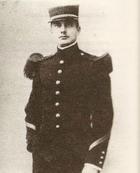
Jean de La Ville de Mirmont was born on December 2, 1886 in Bordeaux. Scion of a Protestant family of intellectuals - his father, Henri de La Ville de Mirmont, was a renowned professor of Literature at the University of Bordeaux, as well as a translator of the Cicero Discourses and Municipal Councilor of the city - at the age of twenty-two he settles in Paris, where he meets his childhood friend François Mauriac, from whom he becomes intimate. He obtained an official position in the Prefecture of the Seine, and in 1914, when the first world war broke out, he was mobilized with the rank of sergeant of the 57th Infantry Regiment. He died on November 28, 1914, buried by the explosion of a howitzer near the Chemin des Dames, in front of Verneuil. Writer of an unusual brilliance, whose art had barely begun to dawn, his masterpiece is The Sundays by Jean Dézert, published a few months before enlisting in the army and inspired by his gray life as a Parisian official. He is also the author of several poems: L'Horizon chimérique, published posthumously and which became famous when Gabriel Fauré put music to it; the Cahiers rouges, also published posthumously, and, finally, the poetry book Contes. Hero of the last postmodernity, compared by his art and his eccentricity with Georges Perec, the figure of Jean de La Ville of Mirmont has inspired characters of modern novels, and his voice has been claimed in recent years as one of the most original and singular of the French literature of the beginning of the century.





